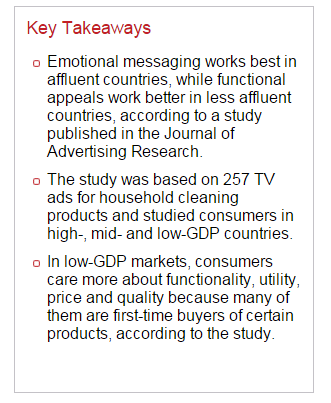 When tailoring their messaging to appeal to different global markets, marketers would be best served to use emotional messaging in affluent countries, while functional appeals work better in less affluent countries, according to a study published in the Journal of Advertising Research in December.
When tailoring their messaging to appeal to different global markets, marketers would be best served to use emotional messaging in affluent countries, while functional appeals work better in less affluent countries, according to a study published in the Journal of Advertising Research in December.
The study, “How To Advertise and Build Brand Knowledge Globally: Comparing Television Advertising Appeals Across Developed and Emerging Economies,” was based on 257 TV ads for household cleaning products and studied consumers in 23 countries: high-GDP countries including Australia, France, Germany, Italy, the Netherlands and the U.K.; mid-GDP countries including Argentina, Brazil, Chile, Mexico, Poland, Russia, Saudi Arabia and Turkey; and low-GDP countries including China, India, Indonesia, Morocco, Pakistan, Philippines, South Africa, Thailand and Vietnam. The researchers compared and contrasted functional appeals—ads that included references to product features and benefits—and emotional appeals, which evoke feelings, imaginations and lifestyles.
The study found that in low-GDP markets, consumers care more about functionality, utility, price and quality because many of them are first-time buyers of certain products, says Bernd Schmitt, professor of international business at New York-based Columbia Business School and co-author of the study. “They might be just entering the middle class and, as a result, they need to learn about the products they’re buying. They may have used one cleaner for everything before, and now they have choices: One cleans the toilet, one cleans the dishes. Marketers there also aren’t using emotional messages yet, so, as a result, consumers don’t fully understand them.”
In mid- and high-GDP markets, on the other hand, brands have been differentiating their products based on emotion for years, and consumers, therefore, are much savvier when it comes to marketing messages, Schmitt says. “It’s all psychological: [An ad might show] a happy family where everyone’s smiling or, when you use a certain cleaner, it reflects something about your achievements in life.”
Global appeals also work well in low-GDP countries, says Lia Zarantonello, associate professor of marketing at the Bath, U.K.-based University of  Bath School of Management and co-author of the study. “Consumers from low-GDP countries attach aspirational values to global brands and they aim to be part of the ‘global village.’ In those countries, marketers should use advertising to show how brands can allow consumers to do that.” Ads with cartoons and children can be used to create a global appeal in low-GDP countries, while story-line narrative, special effects, emotional tone of voice, and fast-paced ads can be used to create emotional appeals in high- and mid-GDP countries, she says.
Bath School of Management and co-author of the study. “Consumers from low-GDP countries attach aspirational values to global brands and they aim to be part of the ‘global village.’ In those countries, marketers should use advertising to show how brands can allow consumers to do that.” Ads with cartoons and children can be used to create a global appeal in low-GDP countries, while story-line narrative, special effects, emotional tone of voice, and fast-paced ads can be used to create emotional appeals in high- and mid-GDP countries, she says.
Schmitt expects low-GDP countries to catch up to the developed world in terms of emotional appeals over the next decade. “In emerging markets, the functional marketing concepts focused on product features still work, and even though consumers there aren’t ready for [emotional] marketing yet, overall development is probably going toward it,” he says.
Authored by Christine Birkner,senior staff writer for Marketing News
Source:ama

